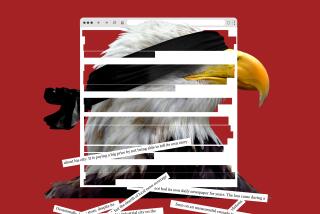Asia’s Sick Economy Also Infects the Press
- Share via
It’s hard to imagine that with even fewer news media outlets than Asia now has, the region would somehow be better off. But this looks to be exactly Asia’s fate as the economic crisis takes its gruesome toll.
One major condition of the $57-billion Korean bailout by the International Monetary Fund requires conglomerates to pull the plug on loss-making subsidiaries. In general that’s not a bad idea: Many of these government-welfare operations, in Korea and elsewhere in Asia, long ago should have been sent to that great profit and loss statement in the sky. But those who value media diversity will now worry because the across-the-board IMF rule is suffocating Asian newspapers, especially the conglomerate-subsidized variety. Two Korean newspapers owned by chaebols, or industrial conglomerates, that once were more interested in clout than profit are now in deep trouble.
It’s hardly all the IMF’s fault that the Asian newspaper business is in serious difficulty these days. The region’s media moguls who, like many of their colleagues in other businesses, abandoned common sense during the wildly overextended go-go years of 1992-1997 are to blame, too. In Indonesia, rising newsprint prices and a falling currency have driven the majority of its more than 250 newspapers and magazines--employing more than 5,500 journalists and many countless thousands of other workers and street sellers--perilously close to, or actually into, the red. In Thailand, one-third of the country’s news media people are now out of jobs, and a dozen mostly small newspapers have closed shop since that brutal baht-battering month of last July. Now, the major dailies are having a hard time staying afloat, as advertisers slash media budgets and imported newsprint costs more by the month. Even the rowdily democratic Philippines press, with eight top national dailies and almost two dozen tabloids, is starting to feel the crunch; advertising revenues have nose-dived by 50% this year. The one bright spot in the news media scene, says Ellen Tordesillas, columnist for the Manila newspaper Malaya, is that financial coverage has become more aggressive.
Some of the powers that be, including Indonesia’s increasingly batty President Suharto, are happy being watched by fewer reporters; Suharto actually blames the news media for starting the economic crisis by reporting on it. In reality, say Western media-rating institutions like the U.S.-based Freedom House, Asia’s news media are scarcely all that pugnacious, particularly in Indonesia. Indeed, the thought arises that a truly independent press might have been able to spare the country and the people Suharto claims so much to love had it not been prevented from doing its full job. Like so much else these days, Suharto has it topsy-turvy: Had his press been freer, the hole out of which Indonesia must now dig itself might well be shallower.
Lee Hyun-nak, a director at the Korean newspaper Dong-A Ilbo, put it well about his nation’s far more independent media: “The Korean press must share the responsibility. The media failed to adequately warn economic decision makers and the public that their reckless [business and government] practices could lead to catastrophe.”
Back in October, even before the crisis’ full dimensions were plain, distinguished Asian journalists aired exactly that concern at the Asia-Pacific Journalists’ conference in Tokyo, organized annually by Japan’s Foreign Press Center. There, editors and reporters from throughout the region, whether speaking on the podium or privately in the back rooms, lamented their culture’s debilitating preference for secrecy and their business community’s characteristic dependency on it.
To be sure, press freedom doesn’t always produce perfect results. America was swept into the savings and loan debacle of the 1980s with scarcely any warning from its well-heeled and well-equipped news media. India has had a terrible economy for years and gaping corruption for as long as anyone can remember; it also has a press that’s as free as anyone’s
And a quieter press doesn’t always spell disaster: In Singapore, authorities so far have avoided many of the region’s most serious economic problems, despite a press constrained by custom and government. Notwithstanding such anomalies, an alert and aggressive press is on the whole an essential hedge against the inherent capacity of government, not to mention the political and business establishment, to slouch toward sloth and stupidity. Any press decline is almost always a symptom of serious underlying problems. It’s hard to see how Asia can get better fast if its press is going south fast. Only the tyrants can be happy now.
More to Read
Sign up for Essential California
The most important California stories and recommendations in your inbox every morning.
You may occasionally receive promotional content from the Los Angeles Times.












